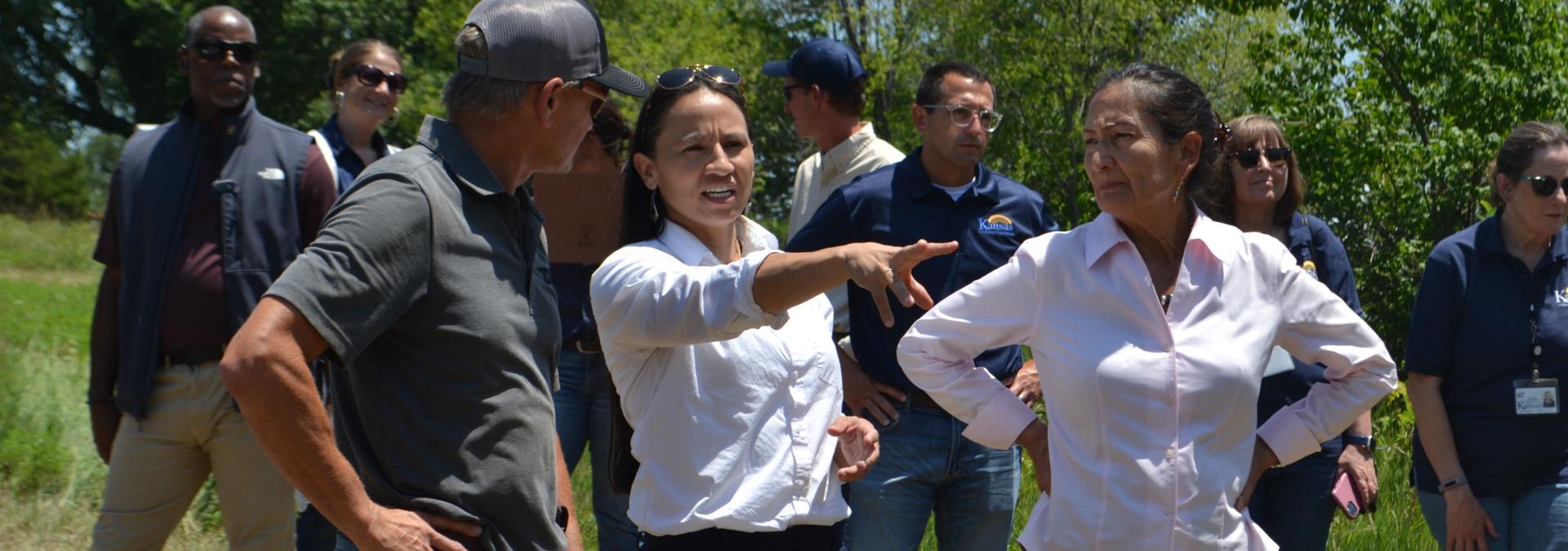Davids, U.S. Interior Secretary Haaland Highlight Federal Efforts to Clean Up Toxic Sites in Kansas

OLATHE, KS - Today, Representative Sharice Davids and U.S. Department of the Interior Secretary Deb Haaland were in Olathe to highlight the bipartisan infrastructure law’s work to clean up more than 5,400 hazardous, abandoned oil and gas wells that are polluting backyards, recreation areas, and public spaces across Kansas. The historic investments to clean up these hazardous sites have already begun creating good-paying, union jobs, introducing new economic opportunity, and reducing dangerous methane leaks. Davids was the only member of the Kansas delegation to vote for the bipartisan infrastructure law.
After today’s community roundtable with local elected officials, community leaders, and labor representatives, Secretary Haaland announced the availability of nearly $660 million in grant funding to clean up toxic abandoned wells across the country. After receiving $25 million in initial funding last September, Kansas is once again eligible for an additional $25 million.
"Abandoned oil and gas wells pose a serious threat to the health and well-being of communities across Kansas, with the vast majority of these sites in the eastern part of our state," said Davids. "Secretary Haaland and I were able to see the bipartisan infrastructure law’s momentous impact while visiting a few those hazardous sites today. I appreciate the Secretary’s focus on keeping our community and environment clean and creating good-paying jobs and new economic opportunities through the bipartisan infrastructure law.”
“As Representative Davids and I saw today, historic investments from the Bipartisan infrastructure Law are good for our climate, for the health of our communities, and for American workers. President Biden’s Investing in America agenda and Bidenomics strategy are enabling us to confront long-standing environmental injustices by plugging orphaned wells throughout the country,” said Secretary Deb Haaland, U.S. Department of the Interior. “With these resources, Kansas and states across our nation will put more people to work to clean up these toxic sites, reduce methane emissions and safeguard our environment.”
“The impact of the bipartisan infrastructure law for plugging abandoned wells in Kansas has been extremely significant,” said Ryan Hoffman, Director of Conservation, Kansas Corporation Commission. “The state of Kansas has been able to address the plugging of more orphaned well sites in six months than we have in the prior three years combined. The federal support has functioned as it was supposed to and kept qualified and highly competent contractors plugging these abandoned wells before they became pollution or safety threats to Kansans.”
More than 100,000 abandoned drilling sites across the country are at risk of emitting dangerous methane gas and leaking toxic pollution into nearby communities. Approximately nine million Americans live within a mile of these hazardous sites, exposing families to critical environmental and public health threats. In Kansas, wells are prioritized for action if they pose a threat to public water supply or safety, and more than 1,300 wells have been plugged in Kansas since the beginning of this year.
The bipartisan infrastructure law includes $4.7 billion in new federal funding to help communities plug orphaned wells. Davids previously announced Kansas will receive a total of $58.6 million in infrastructure law funding to plug the 5,400 hazardous wells in our state. Of that funding, the Kansas Corporation Commission (KCC) has been awarded an initial grant of $25 million to help plug 67 abandoned oil wells in Johnson County and 176 in Miami County. The KCC is using this federal support to pay for eight projects that will plug more than 2300 abandoned wells over the next three years.
The bipartisan infrastructure law, which is paid for through a combination of new revenues and savings, has been called the most fiscally responsible infrastructure bill in at least a decade by the U.S. Chamber of Commerce. Its benefits are already being felt in Kansas, where it’s helping to increase the safety and efficiency of U.S. 69 in Overland Park, expand access to high-speed internet in Miami County, and replace lead pipes in Olathe. Visit here for more information on how the bipartisan infrastructure law is improving Kansas’ roads, bridges, water, and safety.